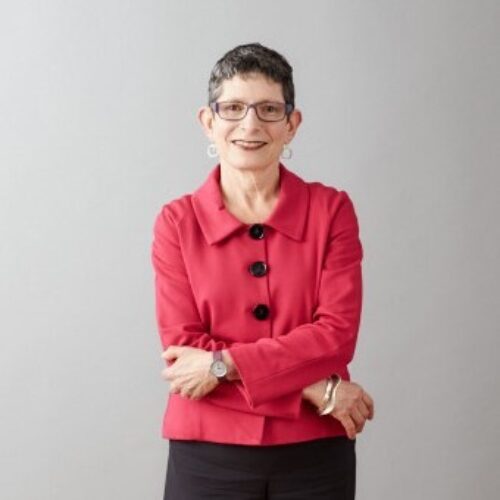- Winter 2023
- Swearing-in of her Honour Justice Jayne Jagot to the High Court of Australia
Swearing-in of her Honour Justice Jayne Jagot to the High Court of Australia

The Honourable Justice Jayne Jagot was sworn in as a Justice of the High Court of Australia in a ceremonial sitting in Canberra on 22 October 2022. Attendees included no fewer than six former members of the High Court of Australia, including the Honourable Mary Gaudron KC, who, when she joined the court in 1987, was the first woman appointed to it. Justice Jagot’s appointment marked another milestone for women: as the Commonwealth Attorney-General, Mark Dreyfus KC who welcomed her Honour on behalf of the Australian Government, pointed out: ‘for the first time since Federation, women make up a majority of the Bench of our highest court’.
According to the President of the NSW Bar Association, Gabrielle Bashir SC, the swearing-in was the culmination of her Honour’s ‘inexorable trajectory’ which was to be on the High Court, whose members, Australian Bar Association President Matt Collins KC noted, have ‘unique and onerous responsibilities’. Foreshadowing a theme that was echoed by all speakers at the ceremony, the Attorney referred to her Honour’s ‘meteoric rise through the legal profession and the judiciary’ and noted that her Honour ‘comes to this court with an incredible breadth and depth of knowledge and expertise’.
Other themes that resonated were her Honour’s central role in a number of high profile and significant decisions, such as Bathurst Regional Council v Local Government Financial Services Pty Ltd,1 described by the Attorney as having been ‘widely lauded as one of the best explanations of the Global Financial Crisis’. Speaking for the Law Council of Australia, Mr Tass Liveris noted, referring to that decision, that ‘by the numbers your Honour delivered a 3,723 paragraph judgment following a hearing spanning 53 days, just 66 days after submissions closed’. In his view, it exemplified her Honour’s ‘prodigious sense of industry’.
But it was not only the blockbuster judgments that drew the speakers’ attention: three of them (including the Attorney) referred to her Honour’s role in the Federal Court’s Native Title Act 1993 (Cth) jurisdiction.2 While it was common ground that her Honour had exceptional legal skills and understanding, another theme that emerged was her Honour’s particular facility with communicating that understanding. Her writing was said to be ‘characterised by the impactful economy of language lending itself to accessible explanations of deep and complex law’ which was said to be a result of her Honour’s being a voracious reader of a ‘wide genre of books’ from ‘The Hunger Games series to military history’.
Other common themes included her Honour’s humility, authenticity, unfailing respect for others, self-deprecating humour, empathy and modesty: as Matt Collins put it ‘Your Honour is the same person on the Bench as off it, the same person sworn in today as a Justice of the High Court as the law student who was interviewed for a summer clerkship by Julie Ward, now President of the NSW Court of Appeal. Good call by the way, Justice Ward’.
More than one of the speeches referred to her Honour’s sense of compassion, expressly articulated in a recent paper given by her Honour, ‘The Value of Compassion in the Law’.3 That speech, which looks at the centrality of compassion to the decisions in Donoghue v Stevenson4 and Mabo (No 2)5 starts with the quote: ‘I am human and I think nothing human is alien to me’.
In her Honour’s own remarks, Justice Jagot referred to what the Honourable Mary Gaudron had said in 1987: that she wished ‘that the day had arrived when the appointment of a woman to this court was unremarkable’. Her Honour noted that she was the seventh woman appointed, and she was joining a bench where the Chief Justice was a woman and (as noted above) her appointment led to the court having a majority of women judges.
Her Honour spoke of how much she has learned from her colleagues and from those who had appeared before her, and expressed gratitude in advance for what she would learn from those who appeared before her in the future. She also spoke of love and support she had received from family and friends, of the fortuitous decision her parents had made to move to Australia, and the opportunities that decision had afforded to her.
Her Honour concluded by indicating that she shared in the beliefs expressed by Justice Gaudron in 1987. Justice Gaudron had said that ‘she believed in three things remaining unchanged: the need for rigorous and dispassionate intellectual analysis; the obligation to ensure equality before and under the law, and the obligation to ensure that justice is done in accordance with the law’. BN
ENDNOTES
1 Bathurst Regional Council v Local Government Financial Services Pty Ltd (No 5) [2012] FCA 1200.
2 Both the Attorney and the President of the Law Council referred to the interlocutory decision in Widjabul Wia-Bul v Attorney General of New South Wales [2022] FCA1187; while the President of the NSW Bar Council referred to the on-Country determination in Western Bundjalung People v Attorney General (NSW) [2017] FCA 992.
3 https://www.fedcourt.gov.au/digital-law-library/judgesspeeches/speeches-former-judges/justice-jagot/jagot-j-20220819.
4 [1932] AC 562.
5 Mabo v Queensland (No 2) (1992) 175 CLR 1.
